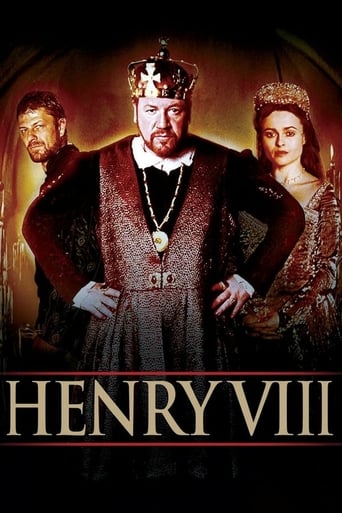fidolofido
Henry VIII is a fantastic film. Granted, there are several mistakes in it, such as minor historical inaccuracies, some shoddy editing, and leaving the viewer slightly unsatisfied in the second half.However, the acting of Ray Winstone in the role of Henry VIII makes up for the mistakes. He delights the viewer in a Henry that loves, roars, kills, and cries, and his dimensions are limitless. Mr. Winstone plays a young, virile Henry equally as well as his dying, grotesque older Henry. His transition from young to old is gradual and delicate, and yet he shocks the viewer at the king's sudden decay. Each wife, all well cast and all well acted, are real women unstilted by their time period. Helena Bonham Carter's Anne Boleyn and Assumpta Serna's Catherine of Aragon are particular stand-outs, with powerful, multi-dimensional performances. The other wives are not given much spotlight in the film, and in the second half of the mini-series the remaining four wives are cycled through quickly and without as much care as Anne Boleyn's section of the film. At the film's end, we are still rooting for Mr. Winstone's Henry, even after the destruction he has caused in England and to his loved ones. The film's arc and journey give us a Henry VIII who learns from his mistakes, and acknowledges his faults.
joligreeneyes
I REALLY liked this movie, regardless of the inaccuracies that may or may not have been filmed. I think Ray Winstone is believable as a young,(and older) sexy Henry the VIII, whom ladies of the court could have fallen for. He had it going' on, and was a player before his time--much to Anne Bolelyn and Katherine Howard's ill fortune. One must remember, that a movie must cram years of documented history/happenings into a 2-4 hour production, therefore a lot gets deleted. I enjoyed this movie very much, and having watched it, it made my trip to England and the Tower of London all the more history-worthy, and special. Tower green has left a lasting impression of sorrow and history upon me. Adores history and movies, Me
George Parker
"Henry VIII" (2003) tells the story of England's King Henry VIII (1491-1547). Ray Winstone is the centerpiece of the film as Henry, a robust and brutal but secretly sensitive King obsessed with siring a male heir to throne. The TV miniseries spends its 4 hour run focused on Henry's involvements with his six wives while dabbling in other benchmarks of his reign and taking liberties where possible for dramatic purposes. Not the best possible historical accounting of the period, this colorful and energetic film does offers some very solid performances and good production value. "Henry VIII" is an enjoyable primer for the not too critical viewer who seeks entertainment value over historical accuracy. (B)
ejj1955
I second most of the comments already made about the historical inaccuracy of this program, but want to add yet another quibble: the scenes that purport to show the dissolution of the monasteries. What a bunch of hooey! I thought I was watching a scene from some movie of the Vikings raiding and pillaging the English coast. What actually happened was that inspectors were sent around and anything of value was methodically stripped and either taken for the royal treasury or sold; the monasteries were then pulled down, bells were melted, etc.; the monks and nuns were given pensions. It's true that servants were turned off without work, causing hardship; it's also true that those who were especially obdurate were tried and executed, but the slashing swords and burning monks fleeing from buildings were complete inventions of the filmmakers. I just don't see the point--fiction is the name for this (not even historical fiction--just fiction).


